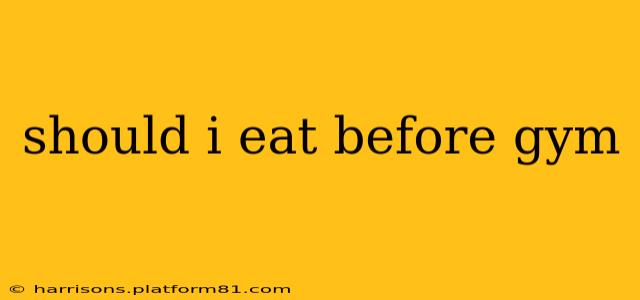Deciding whether to eat before hitting the gym is a common question among fitness enthusiasts. The answer, however, isn't a simple yes or no. The ideal pre-workout nutrition strategy depends on several factors, including the intensity and duration of your workout, your personal preferences, and your body's response to food. This guide will explore the nuances of pre-workout fueling to help you determine the best approach for your fitness goals.
What Happens When You Exercise Without Eating?
Working out on an empty stomach taps into your body's glycogen stores (stored carbohydrates) for energy. While this can lead to some fat burning initially, prolonged exercise without fuel can lead to decreased performance, fatigue, and even dizziness or lightheadedness. Your body may also start breaking down muscle protein for energy, counteracting your fitness goals.
What Are the Benefits of Eating Before a Workout?
Eating before a workout provides your body with readily available energy, improving your stamina and performance. A well-timed meal or snack can enhance your focus and prevent fatigue, allowing you to push harder and achieve better results. The type of fuel you consume also matters, as carbohydrates provide the quickest energy source for your muscles.
What Should I Eat Before a Workout?
The best pre-workout meal or snack is one that is easily digestible and provides a balance of carbohydrates and, to a lesser extent, protein. Avoid high-fat foods, as they take longer to digest and can cause digestive discomfort during your workout. Here are some good options:
- Small portions of complex carbohydrates: Oatmeal, whole-wheat toast, banana, or a small sweet potato. These provide sustained energy release.
- Lean protein: A small amount of Greek yogurt, a hard-boiled egg, or a handful of nuts can help with muscle recovery.
- Simple carbohydrates: A small amount of fruit juice or a sports drink can provide a quick energy boost before intense exercise.
Avoid very large meals within an hour or two of exercise. Give your body time to digest and prevent digestive upset.
How Long Before My Workout Should I Eat?
The timing of your pre-workout meal or snack is crucial. Eating too close to your workout might lead to stomach cramps or discomfort. Eating too far in advance could leave you feeling sluggish. Generally, a light snack 30-60 minutes before your workout is ideal. A larger meal should be consumed 2-3 hours before.
What if I Don't Feel Like Eating Before the Gym?
Some individuals find that they perform better on an empty stomach. This is perfectly fine, as long as you are not experiencing any negative effects like dizziness or extreme fatigue. If you choose to workout fasted, ensure you consume a nutritious meal or snack soon after your workout to replenish your energy stores and aid in recovery.
What About Pre-Workout Supplements?
Pre-workout supplements often contain ingredients like caffeine and creatine, designed to boost energy and performance. However, it's crucial to choose reputable brands and follow the recommended dosages. Consult with your doctor or a registered dietitian before using any supplements, especially if you have underlying health conditions.
Can I Eat After My Workout?
Yes! A post-workout meal is equally important for muscle recovery and replenishing glycogen stores. Focus on a combination of carbohydrates and protein to optimize recovery.
Should I Eat Before a Low-Intensity Workout?
For low-intensity workouts like a leisurely walk or yoga, you may not need to eat beforehand. Listen to your body. If you feel fine without food, it's likely not necessary. However, for longer, low-intensity workouts, a light snack could be beneficial.
Should I Eat Before a High-Intensity Workout?
High-intensity workouts demand more energy. A small, easily digestible snack or meal 30-60 minutes before is generally recommended for optimal performance and to prevent energy crashes.
Ultimately, the best way to determine whether you should eat before the gym is through experimentation. Pay attention to your body's signals, monitor your energy levels and performance, and adjust your pre-workout nutrition strategy accordingly. If you have any concerns or specific dietary needs, consult with a registered dietitian or certified personal trainer for personalized guidance.
